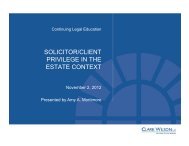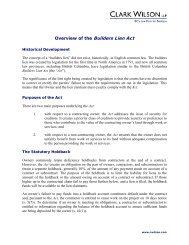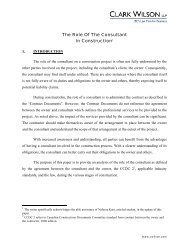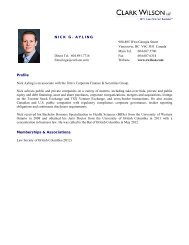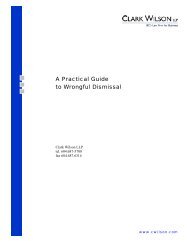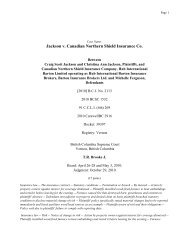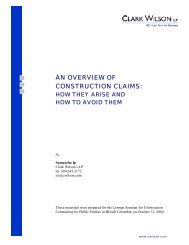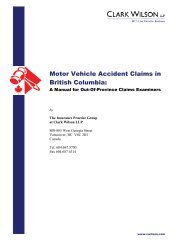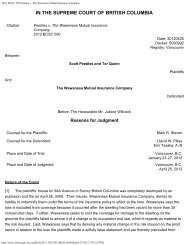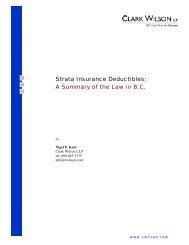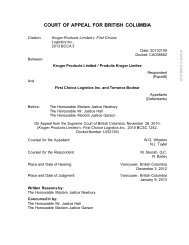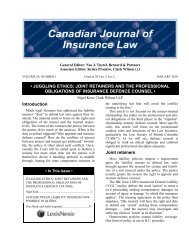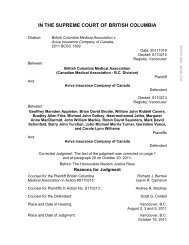juggling ethics: joint retainers and the ... - Clark Wilson LLP
juggling ethics: joint retainers and the ... - Clark Wilson LLP
juggling ethics: joint retainers and the ... - Clark Wilson LLP
You also want an ePaper? Increase the reach of your titles
YUMPU automatically turns print PDFs into web optimized ePapers that Google loves.
p. 8<br />
an explanation of <strong>the</strong> concept of undivided loyalty <strong>and</strong> his duties to each client in that regard; 10<br />
<br />
<br />
advise (a warning?) that none of <strong>the</strong> information received by <strong>the</strong> lawyer will be confidential as<br />
between <strong>the</strong> two clients <strong>and</strong> will be made available to each of <strong>the</strong>m; <strong>and</strong><br />
that an agreement is required as to what is to happen should a conflict arise between insurer<br />
<strong>and</strong> insured (which agreement must amount to “informed consent”, which in certain<br />
circumstances may even require <strong>the</strong> obtaining of independent legal advice).<br />
In this writer’s experience, spanning almost 30 years, <strong>the</strong> above requirement (a “Chapter 6 letter”) has<br />
been almost universally ignored by <strong>the</strong> insurance bar in British Columbia. For sure, some of <strong>the</strong><br />
concepts may have been incorporated into a sophisticated “Non‐Waiver Agreement” which <strong>the</strong> insurer<br />
may have presented to <strong>the</strong> insured in certain situations 11 . However, such a Non‐Waiver Agreement<br />
does not meet all of <strong>the</strong> requirements of Chapter 6 including <strong>the</strong> most obvious requirement that <strong>the</strong><br />
statements/explanations in question must come from <strong>the</strong> defence lawyer not <strong>the</strong> insurer.<br />
In early 1999 <strong>the</strong> LSBC became aware that insurers were increasingly imposing upon <strong>the</strong>ir defence<br />
lawyers formal litigation h<strong>and</strong>ling <strong>and</strong> billing guidelines. Those guidelines, which are now quite common<br />
place in <strong>the</strong> insurance industry, required defence lawyers to obtain <strong>the</strong> permission of <strong>the</strong> insurer before<br />
carrying out certain tasks in <strong>the</strong> litigation or before incurring certain expenses. They imposed caps or<br />
restrictions on rates for certain tasks <strong>and</strong> refused payment for o<strong>the</strong>r tasks. In addition, some insurers<br />
required <strong>the</strong> defence lawyer’s fee accounts to be submitted to external auditors for review <strong>and</strong> approval<br />
prior to payment.<br />
The Law Society was very concerned that <strong>the</strong> guidelines had <strong>the</strong> potential to interfere with counsels’<br />
professional judgment in <strong>the</strong> conduct of litigation <strong>and</strong> that <strong>the</strong> submission of an account to a third party<br />
auditor might, in <strong>the</strong> absence of informed consent from <strong>the</strong> insured, breach solicitor‐client privilege <strong>and</strong><br />
contravene <strong>the</strong> lawyer’s duty of loyalty <strong>and</strong> confidentiality to <strong>the</strong> insured. Ultimately, <strong>the</strong> Law Society<br />
issued opinions condoning <strong>the</strong> practices in question but urging defence lawyers to exercise caution 12 .<br />
In October 2003 <strong>the</strong> Law Society again ventured into <strong>the</strong> field of <strong>the</strong> appointment by insurers of lawyers<br />
to defend third party liability claims. This time <strong>the</strong> Law Society’s concern related to <strong>the</strong> increasing<br />
frequency of “bad faith” claims against liability insurers for failing to settle claims within policy limits <strong>and</strong><br />
to <strong>the</strong> related potential exposure of defence lawyers to professional negligence claims. The resulting<br />
“Alert!” bulletin issued to <strong>the</strong> profession 13 included, among o<strong>the</strong>r things, <strong>the</strong> following suggestions:<br />
<br />
“Write to insured at <strong>the</strong> outset to advise of <strong>the</strong> [<strong>joint</strong>] retainer, its scope <strong>and</strong> its limitations. Be<br />
sure that <strong>the</strong> insurer is also aware of <strong>the</strong> scope <strong>and</strong> limitations of <strong>the</strong> retainer;<br />
10 The LSBC in its sample Chapter 6 letter suggests: “We owe each of you a duty of undivided loyalty. This means<br />
that we must act in your best interests at all times <strong>and</strong> must not favor <strong>the</strong> interests of one of you over <strong>the</strong> interests<br />
of ano<strong>the</strong>r, or allow anything to interfere with our loyalty to you or our judgment on your behalf. If we are unable<br />
to fulfill this duty of undivided loyalty, we will have to withdraw from this <strong>joint</strong> representation”.<br />
11 See <strong>the</strong> sample agreement attached to N.P. Kent “Preventative Paper Work: Non‐Waiver Agreements,<br />
Reservation‐of Rights Letters <strong>and</strong> <strong>the</strong> Defence of Claims in Questionable Coverage Situations” (1995) 17 Adv. Q.<br />
399<br />
12 See Appendix 1<br />
13 Appendix 2<br />
© 2009 <strong>Clark</strong> <strong>Wilson</strong> <strong>LLP</strong> cwilson.com<br />
Nigel P. Kent, T. 604.643‐3135.



